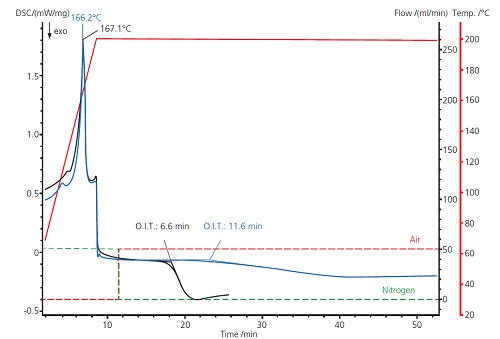Polímeros
Control de Calidad de Polímeros mediante DSC- Estabilidad de Oxidación
Las pruebas de Oxidative-Induction Time (OIT) and Oxidative-Onset Temperature (OOT)Oxidative Induction Time (isothermal OIT) is a relative measure of the resistance of a (stabilized) material to oxidative decomposition. Oxidative-Induction Temperature (dynamic OIT) or Oxidative-Onset Temperature (OOT) is a relative measure of the resistance of a (stabilized) material to oxidative decomposition.OIT (Oxidative-induction time) son muy conocidas para evaluación de resistencia a la oxidación de polímeros, en particular poliolefinas.
En este ejemplo, dos muestras de PP fueron calentadas a 200°C en una atmósfera dinámica de Nitrógeno. El pico EndotérmicoA sample transition or a reaction is endothermic if heat is needed for the conversion.endotérmico detectado durante el calentamiento ilustra la fusión del polipropileno. Después de 3 minutos a 200°C, el gas se cambió a aire. El efecto ExotérmicoA sample transition or a reaction is exothermic if heat is generated.exotérmico resultante indica la degradación del polímero.
En este caso, la oxidación ocurre antes en la muestra A que en la muestra B (Oxidative-Induction Time (OIT) and Oxidative-Onset Temperature (OOT)Oxidative Induction Time (isothermal OIT) is a relative measure of the resistance of a (stabilized) material to oxidative decomposition. Oxidative-Induction Temperature (dynamic OIT) or Oxidative-Onset Temperature (OOT) is a relative measure of the resistance of a (stabilized) material to oxidative decomposition.OIT 6.6 min vs. 11.6 min).
